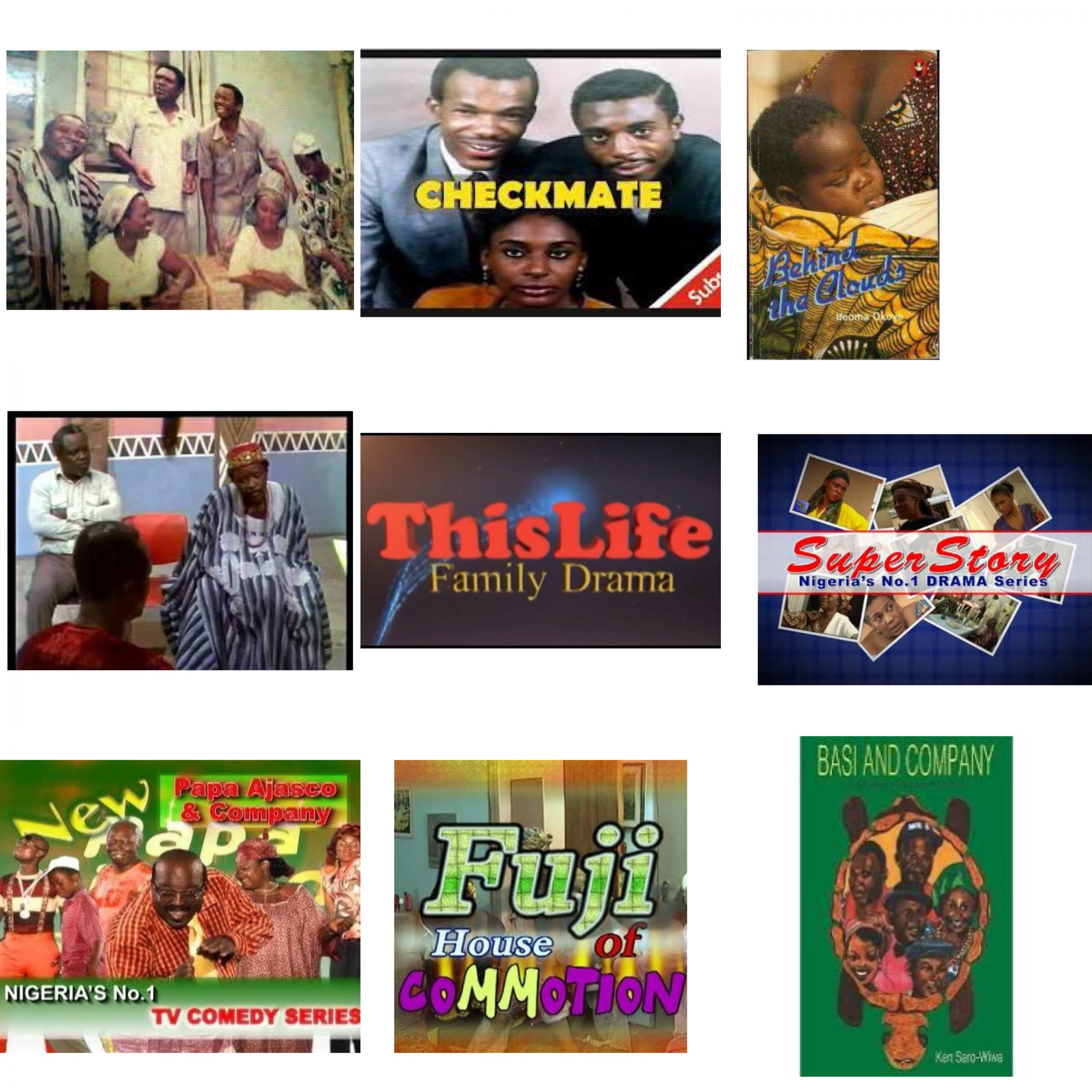By Abimbola Mohammed
If you grew up in the 80s, there’s a good chance that you spent at least some of your time watching a soap opera. These melodramatic television programmes were all the rage back then, and it’s easy to see why. They brought families, friends, and neighbors together to share in their collective obsession.
Some people watch these soaps because it had a massive cast of characters that viewers could get attached to. It also boasted some powerful storylines, which ranged from affairs and divorces to love, marriage, morals, family orientated, horror and comedy. And let’s not forget the ever-evolving love triangles!
If you’re looking to remember soap opera that dominated the airwaves in the 80s and 90s, here are the list
The Masquerade was a Nigerian sitcom that aired on the Nigerian Television Network on Tuesday nights from 8:30 pm – 9:00 pm during the 1980s until the mid-1990s. It was created and written by James Iroha who also acted in the sitcom. It is one of Nigeria’s longest-running sitcoms. The TV show started as a radio program known as The Masquerade transmitted on the East Central State Broadcasting Corporation, Enugu. It used to be one of the most watched situational comedy series as long as it ran on the network service of the Nigeria NTA.
Characters are Chika Okpala as Zebrudaya, Lizzy Evoeme as Ovuleria, Claude Eke as Jegede Sokoya, James Iroha as Giringori Akabogu, Christy Essien-Igbokwe as Apena – Sokoya’s wife, David Ofor as Clarus.
Behind the Cloud: In the mid-80s, Fom starred as Nosa in Behind the Clouds, one of a bevy of soap operas that dominated the airwaves at a time NTA held a monopoly over television broadcasting in Nigeria.
The drama series told the story of families living in Jos, with the Okonzua family being the most popular. This was due to Zack Amata‘s impeccable acting as a stern father who defiantly stood against his daughter Efe’s (Evelyn Ikuenobe-Otaigbe) music career. Efe’s younger brother Nosa, as well as their caring mother, Adesuwa (played by Franca Brown), were, however, in total support of her chosen career path.
The Village Headmaster (later renamed The New Village Headmaster) is a drama series created by Olusegun Olusola and produced by Dejumo Lewis. Originally a radio drama series, the programme was Nigeria’s longest-running television soap opera shown on the NTA from 1968 to 1988 and starred Ted Muroko as the original headmaster. The series was developed by Nigerian Broadcasting Corporation and is considered one of the early successes of television drama in the country.
In 2021, a new revival of the show was announced, with Chris Iheuwa in the lead role of the headmaster. Several actors from the earlier series are also returning.
The drama was produced in 1958 and aired on radio for six years before its format transitioned into a television series on NBC TV Lagos (later NTA). A full series began in 1968 with an initial order of 13 episodes and ran until 1988. The original recordings are not known to have survived. The 1964 master script by Segun Olusola was published by Ariya Productions in 1977 with a cover drawing by cartoonist Josy Ajiboye.
Checkmate: is a Nigerian television serial that ran from Thursday, April 4, 1991, to 1994, created by Amaka Igwe and sponsored by Lever Brothers Nigeria. It starred Ego Nnamani, Francis Agu, and Richard Mofe Damijo. Set in Lagos, the story focuses on the Hastrop family, the enemies determined to destroy their business and legacy, and their friends and associates. Checkmate is seen in the show’s opening credits, where a chess player’s king is directly attacked by an opponent’s pawn, making escape impossible.
Checkmate has been hailed as part of the “golden age of television in Nigeria”, prior to the Nollywood home-video boom of the mid-1990s. Several of these alumni were associated with this and went on to achieve success.
Fuji House of Commotion: is a Nigerian sitcom. Produced and directed by Amaka Igwe, the show was a spin-off of nineties soap opera Checkmate – one of the few Nigerian television programmes to have obtained that status.
It stars Kunle Bamtefa as Chief Fuji, Toun Oni as Mama Moji, Ngozi Nwosu as Peace, Louisa Onu as Ireti, Ireti Doyle as Caro, Jude Orhoha as Gbenro, John Njamah as Rabiu, and Chika Chukwu as Jumoke among others.
The sitcom revolves around a rich man (Chief T.A. Fuji) who is married to four women and had numerous kids to provide for. Some episodes also feature family friends such as Victor Eze as Alika.
Papa Ajasco And Company (formerly The Ajasco Family) is a Nigerian family television sitcom created by Wale Adenuga in 1996. The show is a spin-off of a feature film of the same title produced by Wale Adenuga in 1984, which in turn is based on the Ikebe Super comic magazine. The story revolves around the Ajasco family and their comic interpretations of major societal issues. The main characters include womanising patriarch Papa Ajasco, his long-suffering wife Mama Ajasco, their mischievous son Bobo Ajasco, local playboy Boy Alinco, promiscuous gold-digger Miss Pepeiye, and illiterate ne’er-do-wells Pa James and Pa Jimoh. At its prime, Papa Ajasco was widely considered to be Nigeria’s most-watched comedy series, viewed weekly in twelve African countries.
Papa Ajasco television series is widely watched across families in Nigeria. In 2010, it debuted in Ghana through Ghana Television and was reputed to be the “best comedy on television” in the country.
Super Story is a Nigerian anthology television drama series created by Wale Adenuga who published the magazine on which the programme is based. The series originally aired on Thursdays by 8 p.m on NTA; currently, Super Story is shown on NTA and Wap TV every Thursday by 8:00 pm and airs on several other terrestrial and cable networks at a later time.
It won the best television series at the Nigerian Broadcasters Merit Awards in 2016.
This Life: One of the drama series from the stable of the legendary Wale Adenuga is aptly entitled ‘This Life’. And, yes, this life! Wale Adenuga started small. I remember in my secondary school days, his Ikebe Super, Papa Ajasco, and Dauda (Lolly) gave us youngsters much to talk and laugh about.
Basi And Company (also known as Mr. B) was a Nigerian sitcom that ran from 1986 to 1990 on NTA and was later syndicated across Africa. Written and produced by Ken Saro-Wiwa and filmed in Enugu, the show derived inspiration from African folklore and lampooned widespread corruption in oil-rich Nigeria while highlighting its consequences. To date, it remains one of Africa’s most watched comedy programmes, with an estimated thirty million viewers during its peak.
Basi and Company was the first book of the hugely successful Nigerian comedy television series, which at its peak was watched by an estimated 30 million Nigerians. The New York Times described the show as ‘Nigeria’s hottest comedy show that seems to have struck a chord because it lampoons modern Nigeria’s get-rich-quick mentality. Basi is an exceptional man, in keeping with the best traditions of tricksters in Yoruba folklore, satirising the get-rich-quick mentality. The author translated the folktale into a contemporary idiom, believing that this format accorded better with African narrative methods.





Comment
No comments found.